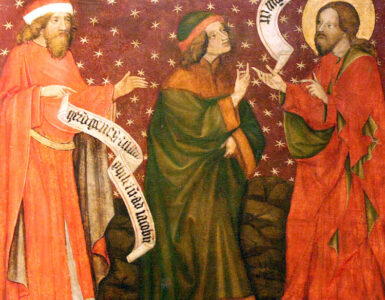After Easter, the Church reads the Acts of the Apostles as a narrative of the immediate early Church. The book is a history of the apostles’ missionary journeys after Christ’s Ascension. The challenge in reading Acts of the Apostles is reading it within its deep temporal dimension—one that extends far beyond the immediate events described in the text. While the Acts of the Apostles might seem like a straightforward account of the early Church’s history, especially as it is contained within the 28 chapters of a single book, a more detailed examination reveals that the events described cover a much longer span of time and also serve as a bridge between different historical and theological periods. The book fits within the broader timeline of salvation history as connects the resurrection of Jesus Christ to the development of the universal Church.
We often assume that the events described in the Acts of the Apostles happen shortly after the resurrection of Jesus, within a few decades. However, this is only a small portion of the reality. The narrative begins with the Ascension of Jesus and the coming of the Holy Spirit at Pentecost, which then leads into the missionary journeys of Peter, Paul, and others.
The Acts of the Apostles covers several decades, but we often think of these events as taking place in the span of just a few years—around the 30s and early 40s AD. However, the book itself does not give us precise dates for each event. In fact, we have to rely on external historical sources, the letters of St. Paul, and other writings from early Christian communities to extend our understanding of the timeline beyond the immediate sequence described. This temporal stretching allows us to place the text in the larger context of the Roman Empire, the Jewish diaspora, and the growth of early Christianity in the midst of political and cultural upheaval.
From a theological standpoint, the Acts of the Apostles does more than just tell us the history of the Church. It marks a major shift in the fulfillment of God’s covenant. The book connects the resurrection of Jesus to the establishment of the Church, showing the extension of God’s salvific plan beyond the Jewish people to the Gentiles. This narrative reveals that the Church’s mission that was set into motion by Christ’s Resurrection and Ascension. Yet, it is not confined to a brief historical moment. The timeline in Acts of the Apostles is more like the opening of a chapter in a much larger book of salvation history. The Apostles are not merely reacting to immediate events but also laying the foundation for what will unfold over centuries. The events recorded in Acts of the Apostles reverberate throughout history as the Church grows, faces persecution, and spreads throughout the world.
Theologically, we can view this period as a bridge from the Old Covenant, which was fulfilled in Christ, to the New Covenant, which continues to unfold today. It is important to understand that while Acts of the Apostles details the apostles’ immediate missionary activities, these were part of a greater, ongoing timeline of salvation that transcends time. The Church’s growth continues and will do so until Christ’s return.
In the Acts of the Apostles, we often read about rapid conversions—thousands of people joining the Church in a single day (Acts 2:41). This can give the impression that the spread of Christianity was immediate and dramatic. But the book does not tell us that the journey from Jerusalem to Antioch, or from Antioch to Rome, was as quick and linear as the text may suggest. The realities of travel, communication, and the spreading of ideas were much slower and far more complex. Paul’s missionary journeys, for example, were long and stretched over several years, as were the early Christian communities’ growth in places like Jerusalem, Ephesus, and Corinth.
This highlights the idea that the Acts of the Apostles is not a one or two-decade narrative, but instead reflects a multi-decadal, even multi-generational, process. The conversion of the Gentiles, for example, was not a swift or effortless process. The Council of Jerusalem (Acts 15), which addressed the issue of Gentile converts and their relationship to the Mosaic Law, likely happened several decades after Pentecost. The decisions made there shaped the way the Church would engage with the wider world for generations.
The Acts of the Apostles ends abruptly with Paul in prison in Rome, preaching the gospel freely without hindrance (Acts 28:30-31). This abrupt ending serves as a symbolic reminder that the story of the Church does not conclude with the writing of the New Testament.
The Acts of the Apostles leaves us with a significant theological statement: The Church’s work is ongoing. There is no “closure” to the timeline of this book, which stands in stark contrast to the finality we often expect from other ancient texts. This ending invites us to see the Acts of the Apostles not as the end of a period of time, but as a steppingstone in an ever-growing mission that spans millennia.
The Acts of the Apostles provides a snapshot of early Christianity, but it is just the beginning of a larger, unfolding history. The timeline of the Church’s growth extends far beyond what is recorded in the New Testament, continuing through the lives of countless saints, the development of theology, and the expansion of Christianity to the farthest corners of the world.
The Acts of the Apostles exists in a much longer timeline than what appears at first glance. While the events in the book take place over several decades, the mission of the Church, which began in Acts of the Apostles, continues to unfold today. By understanding Acts of the Apostles as part of a larger narrative of salvation history, we can better appreciate the ongoing nature of the Church’s mission.
The events in Acts of the Apostles may have taken place in a particular historical context, but the work of evangelization, the spread of the gospel, and the development of the Church are still continuing in the present day. This book provides us with a glimpse of the early Church’s struggles and triumphs, but we must recognize that it is merely one chapter in the broader, ongoing timeline of God’s plan for the world.
Today, the Acts of the Apostles is about us!






























